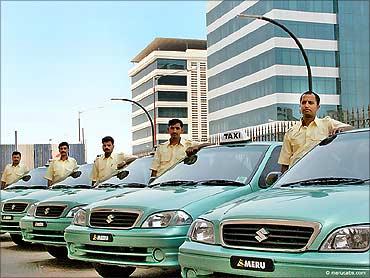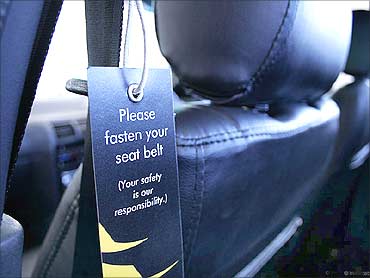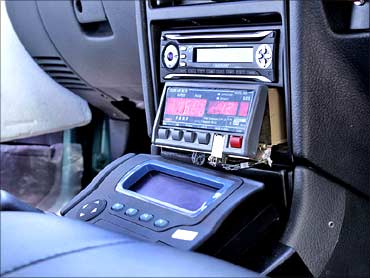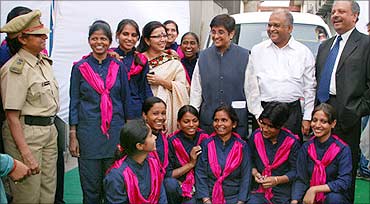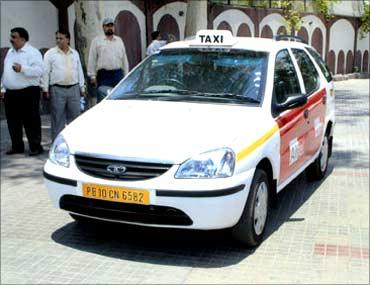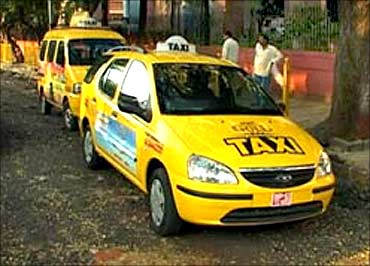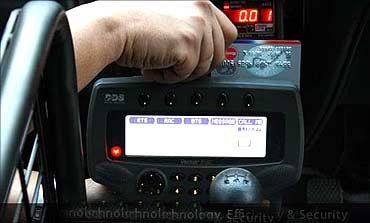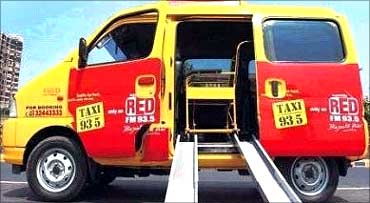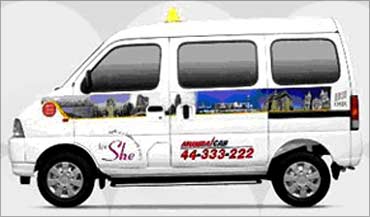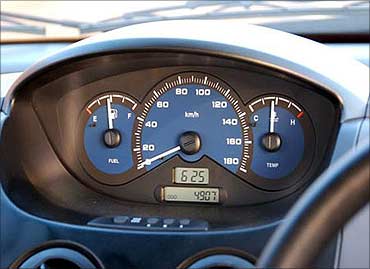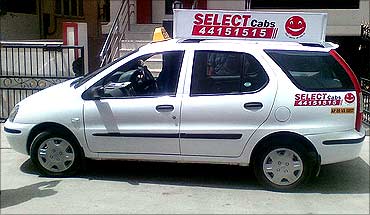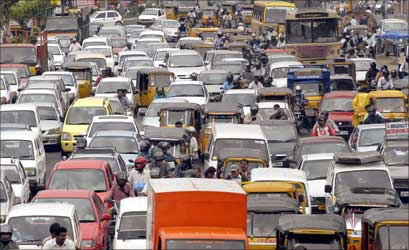 | « Back to article | Print this article |
Boom time for radio cabs in India
The days when you had to depend on old taxis with unruly drivers fleecing you with tampered meters and circuitous routes may soon vanish.
Travelling has, to some extent, become a hassle-free and safe experience in India thanks to radio cabs. Ease of booking, safety and customer service, accurate fare meters, etc make these cars a blessing for locals and foreigners travelling in India.
Five years ago, radio cabs were not so popular. Today, the radio cab service is one of the fastest growing businesses in the transport sector. With a huge demand-supply gap in India, this is a sector many players are keen to explore. Adding to the cab operators' revenues is cab advertisements, which is like a mobile hoarding.
With over 10 players across India cashing on this lucrative market -- Meru, EasyCabs, Select Cabs, Mumbai Gold, Mega Cabs, Metro Cabs, Delhi Cabs, Quick Cabs, and women cab services like Priyadarshini Private Cabs, Go For Pink, and For-She -- the business is set to boom and spread to new cities.
Click NEXT to read more...Boom time for radio cabs in India
Radio cabs offer a secure and safe service, which has made them popular across all cities. While Priyadarshini private cabs (in Mumbai), Go For Pink (in Chennai) and For-She offers (in Mumbai and Delhi) offer cars with women drivers to ensure safe travel for women, other cabs like Meru offer credit card payment system. Most of the cabs offer newspapers and magazines.
The biggest player in the metros, Meru Cabs, began services with 50 cabs in Mumbai in April 2007, has a fleet size of 5,000 cabs across four cities today. It is as good as your own car, says a regular traveller.
Usha Kumari, a call centre executive, says she feels comfortable travelling in private cabs. "We do have a car pool, but since I live the farthest, I get dropped last. Since these cab drivers are registered and my details are with the company, I don't feel insecure."
Click NEXT to read on. . .
Boom time for radio cabs in India
These radio cabs are air-conditioned vehicles equipped with state-of-the-art GPS-based communication technology and most have well-groomed drivers too. The service is backed by a 24x7 customer call centre.
"We are market leaders in the taxi segment with at least 60 per cent market share. The business continues to grow 5 per cent month-on-month," says Gavin D' Abreo, vice president, sale & marketing, Meru Cabs.
More than 10 lakh (1 million) passengers per month across four cities -- Mumbai, Bangalore, Delhi and Hyderabad -- travel in Meru cabs. "Annually, Meru Cabs transports 12 million passengers across 4 cities, which makes it as big as some of the large airlines in the country," says Gavin D' Abreo.
Click NEXT to read on. . .
Boom time for radio cabs in India
A unique venture towards the empowerment of women is For-She Travels and Logistics Private Ltd (FTL).
Launched in February 2008, the company trains women for driving cabs. Launched by entrepreneur Revathi Roy, these cars are exclusively for women travellers. "We have received a good feedback from passengers. We offer a safe travel in cars driven by women trained by us. The drivers are very happy with the new jobs as well. For them, it is a dream come true," says Roy, managing director, For-She.
For For-She, the business has grown 100 per cent sinec the time it was launched. The company now has a fleet of 70 cabs across two cities. "There is more awareness about our service now. The challenge, however, is to get girls who are willing to drive as drivers," says Revathi Roy.
The company has a training institute where girls who have passed eighth standard are enrolled for a 3-month training course for Rs 10,000.
Click NEXT to read on. . .
Boom time for radio cabs in India
A constant monitoring system, cars driven by women, cars designed for the disabled, cars with the option of payment by credit cards, et cetera make radio cabs a viable business in India.
Sharmila Rathore, another regular traveller, was forced to dump her regular cabbie. "He hates me for avoiding him. I had enough of travelling in that dilapidated Fiat," she says.
Asked why she prefers private taxis, and not the cool cabs, Rathore says, "I don't need to go searching for them. Make a simple phone call or an SMS and they are at your doorstep. Moreover, they have proper meters. I have travelled the same distance from Vashi (in Navi Mumbai) to Tardeo (in central Mumbai) in both (cool cabs and privates taxis), and I always ended up paying more, rather much more, whenever I took cool cabs. There is one more reason. When I return to Vashi, I had to pay return toll whether I took the black and yellow, or cool cab. But none of these private cabbies charge you double."
Click NEXT to read on. . .
Boom time for radio cabs in India
This business has turned out to be a win-win situation for all. Radio cabs are mostly overbooked. Though many more players have joined the fray, there is enough business for every one as the city is growing day by day, points out Arun Sabnis, Arun Sabnis, CEO, Mumbai Gold Cabs.
The latest entrant in Mumbai is EasyCabs, run by Carzonrent. In May 2006, it launched EasyCabs from Chandigarh, and now operates across Delhi, Bangalore, Hyderabad and Mumbai with a fleet size of around 2,000. The taxi fare is certainly higher than the normal taxis but passengers say they are willing to pay for the service offered. For-She charges Rs 200 for the first 10 kilometres and Rs 15 for every km thereafter.
"The fare structure is set as prescribed by the government and varies depending on the city. In Mumbai, the fare is set at Rs 20 for the first km and Rs 14 for every subsequent kilometre, say Meru officials. Quick Cabs based in Delhi says it offers services at Rs 9.50 per km.
Click NEXT to read on. . .
Boom time for radio cabs in India
A printed receipt for every fare, providing details of distance traveled and total amount payable makes the system fool-proof. For-She and Meru have also launched payment system via credit card in Delhi, Bangalore and Hyderabad.
Click NEXT to read on. . .
Boom time for radio cabs in India
With a huge market potential of over 1 million cars in India, radio cab players are bullish on business prospects. "We have a fleet size of 130 and we are adding 900 more vehicles in the next 6 months," says Arun Sabnis, CEO, Mumbai Gold Cabs.
The Fulora Foundation which runs Mumbai Gold Cabs also has 'disabled-friendly' cars. Maruti Versa cars have been modified to accommodate the disabled.
Another big player, Mega Cabs started in Delhi with a fleet of 81 taxis in 2001. Today, it has services in Chandigarh, Mohali, Ludhiana, Kolkata and Amritsar, and it has now become the largest network of radio taxi services in India.
Click NEXT to read on. . .
Boom time for radio cabs in India
Followed by its success in two cities, For-She plans to start services in two more metros this year.
According to Mega Cabs, every driver undergoes stringent training from reputed institutes. The drivers' credentials, knowledge about city roads is also checked before he is given a driver's badge.
Delhi Cabs launched by Orix Auto Infrastructure Services offers tourist cabs with an all-India permit.
The cars have mobile phones with emergency contact numbers, music, steel front and rear bumper guard for additional safety. Besides, newspapers, ice box, umbrellas and a medicine kit with puke bags for passengers who have motion sickness are also provided.
Click NEXT to read on. . .
Boom time for radio cabs in India
Customers vouch for the safety and comfort of these radio cabs. Every Meru cab is installed with speed alarm alert. If the driver goes above the stipulated speed limit then there is an alarm that goes off indicating that the speed limit has been crossed and the driver needs to slow down.
People no longer feel scared to travel in a new city. Since all the major airports in India have the radio cab service, it has become very easy for domestic and foreign travellers to move around in the city.
"When I came to Mumbai, I took an ordinary cab. He charged me Rs 200 for a short distance. I did not bother arguing but the real shock came when he said I had paid him only Rs 100 when I had actually given him a Rs 500 note," says Siby, an engineer based in Bangalore.
Boom time for radio cabs in India
Radio cabs are also getting popular in non-metro cities like Hyderabad, Pune Jaipur, etc. Select Cabs, the radio taxi brand of Berggruen Holdings, is betting big on business from the city as well as the Hyderabad International Airport.
EasyCabs will soon expand to Chennai and Pune. The company plans to have 10,000 radio cabs on the Indian roads by end of 2010.
Mega Cabs plans to start services in Ahmedabad and Jaipur. Meru is looking at starting services in Chennai and Kolkata as well.
Car operators are also looking at franchising options to meet the growing demand. But with a boom in business, come a host of challenges.
Click NEXT to read on. . .
Boom time for radio cabs in India
Traffic congestion is a serious problem for these players. There are major challenges for expansion. "We find sabotage activities from taxi unions a main hurdle," rues Sabnis.
Meru officials agree. "Firstly, it is extremely difficult to find a good calibre driver. We have a stringent driver selection process to ensure quality subscriber (driver) induction. For every 8 drivers screened Meru selects one. Also the taxi permits are yet controlled by the government which means that a deserving driver who has the aptitude and interest will not be able to become a Meru entrepreneur unless he has a taxi badge which is difficult to obtain."
Operators also lament on the lack of a single governing body regulating the actions in this industry. "For instance, the telecom industry also has many players but there is a single governing body which monitors and regulates all their actions. Due to this lack of uniform governance the taxi industry is fragmented which results in non-standard rules and random implementation of them," says Gavin D' Abreo of Meru Cabs.
